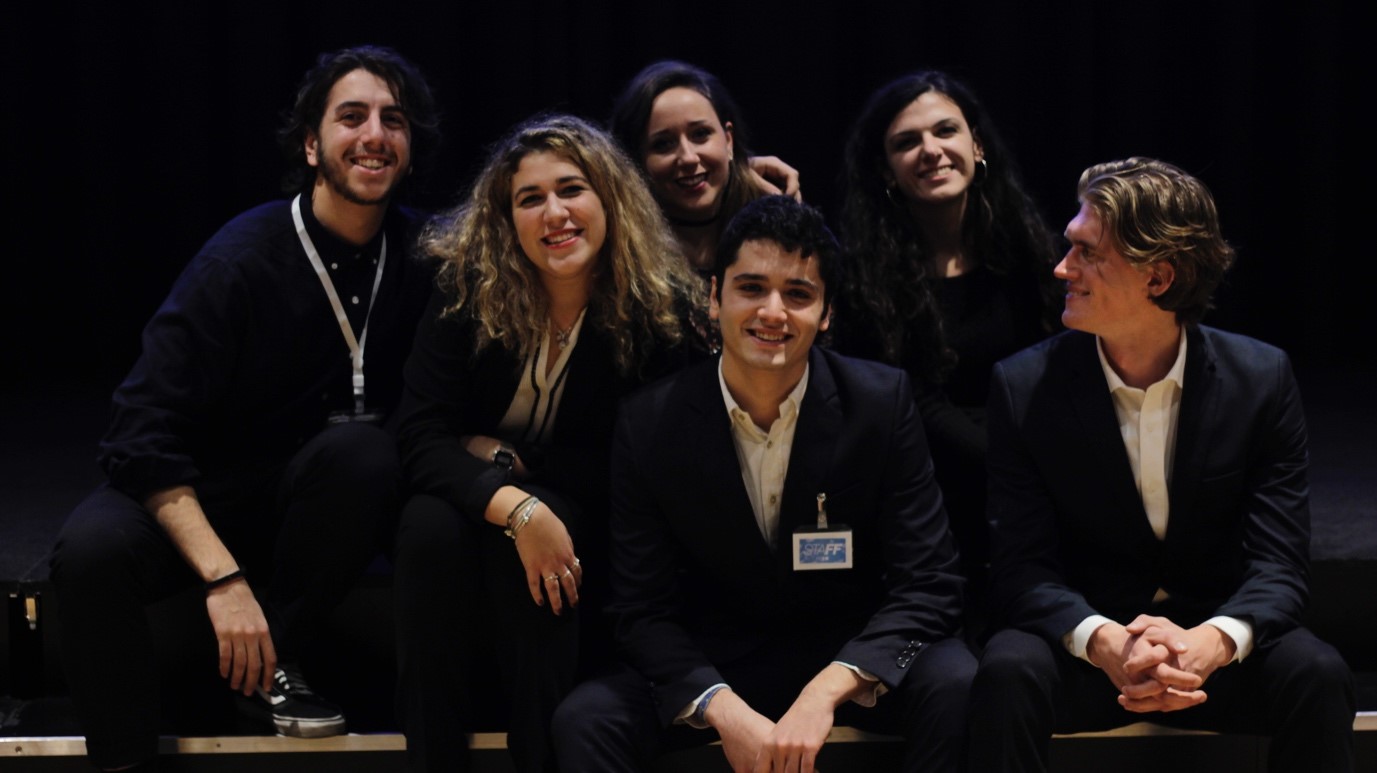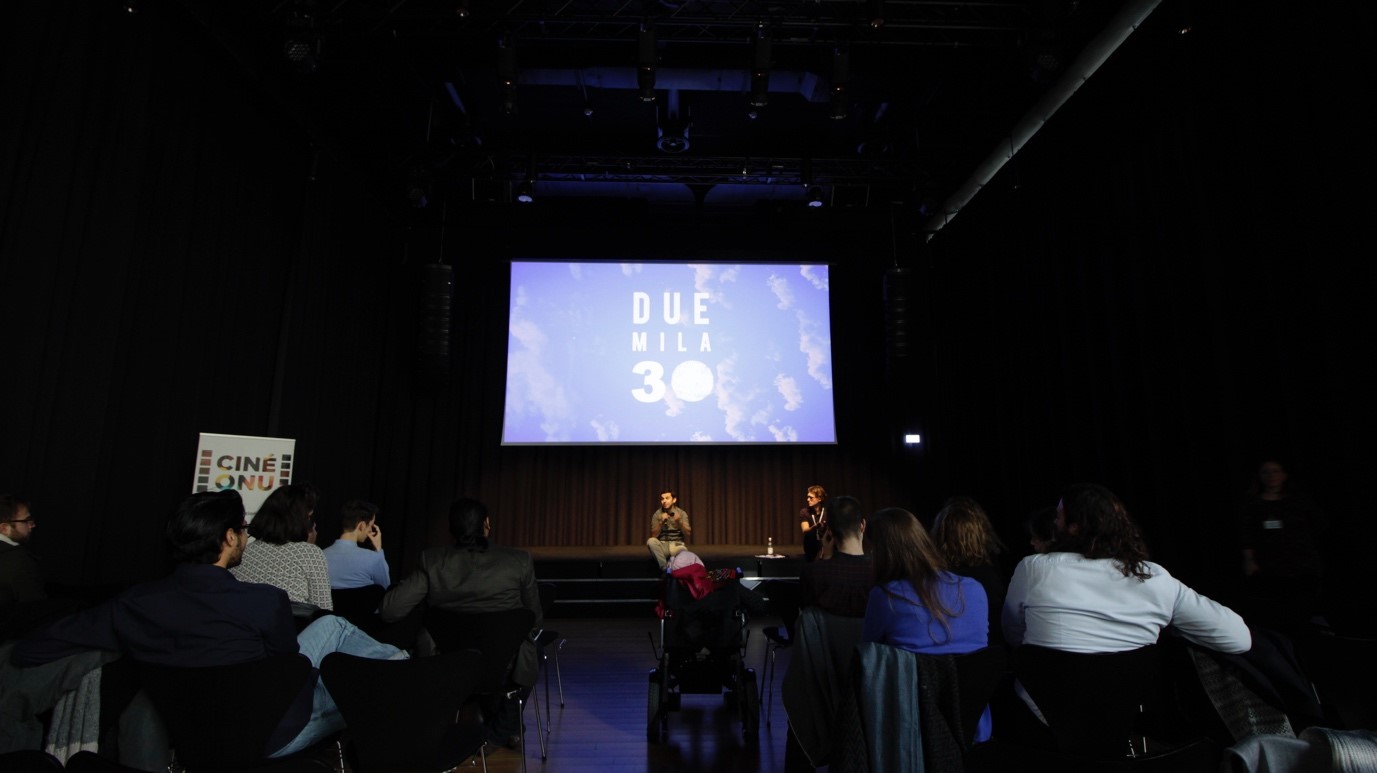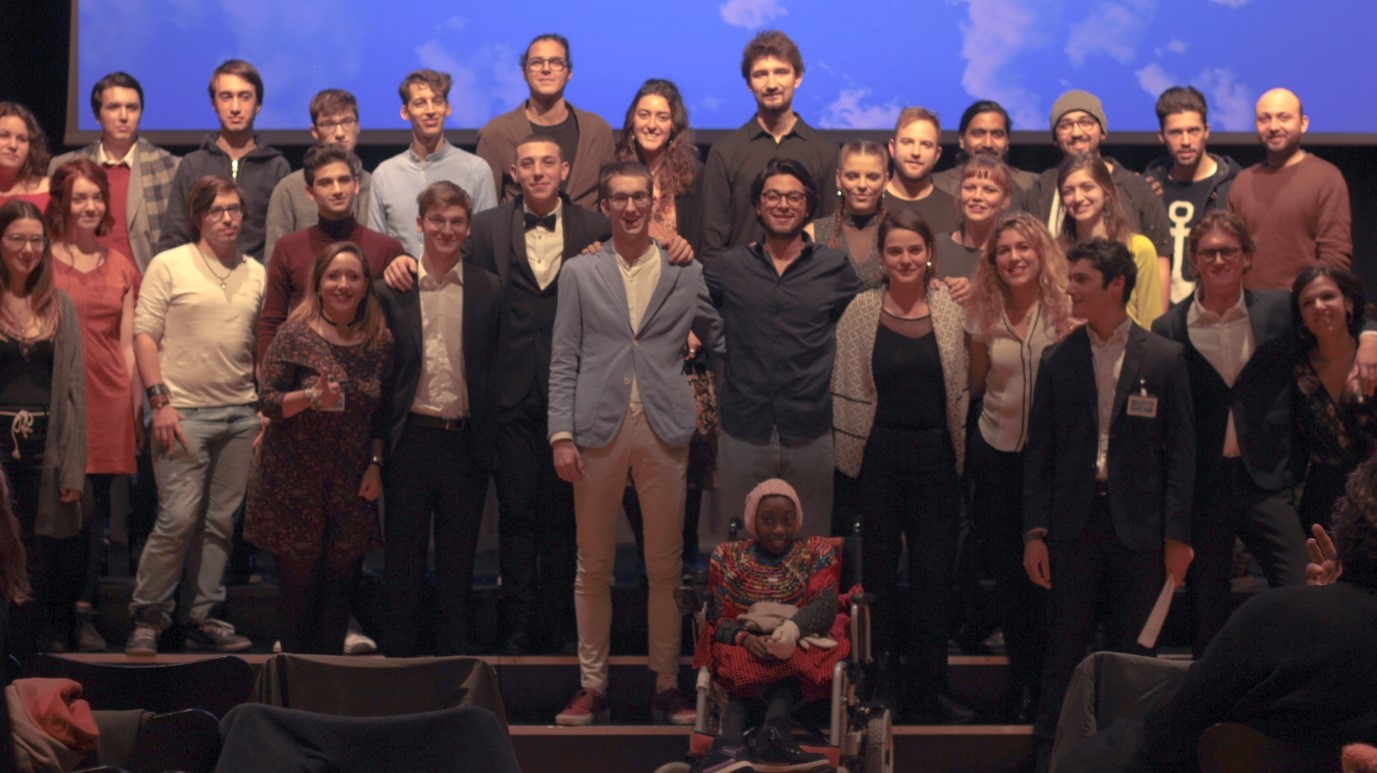Duemila30 - International Short Film Festival for High School and University Students Focused on the UN 2030 Agenda
Description
Duemila30 is an international short film festival, organized by the cultural association Quindici19, in collaboration with UNric, founded five years ago by a group of Italian High School Students. Duemila30 is the only major event completely dedicated to students (both from High School and University) and to the promotion of the UN 2030 Agenda. Through three days of formative experiences, the 50 participating young directors (selected among the 1000 submissions received from over 80 countries) had the chance to understand the movie’s role in building a common social/environmental consciousness and the director’s responsibility in creating awareness through cinema.
The Festival aimed at empowering the future generation of directors, teaching them the importance of social-impact movies in order to generate a lasting legacy. The international dimension of the festival made it extremely effective, especially in the creation of a broad community of both filmmakers and activists. Dealing with the entire Agenda and its promotion through cinema, instead of single SDGs, the project was able to reach the younger generation, less aware of specific target but moved by the urgency of the overall message. <br />
The whole initiative was about communication and inclusion. Communication of the UN 2030 Agenda, of its main goals and targets and of its overall call to act for a better future. Inclusion in terms of bringing together different cultures (represented by the young filmmakers, the international network of film festivals and by movie industry professionals), in order to have various inputs and points of view on possible solutions to the issues highlighted by the SDGs. <br />
The major innovative change of the project is in its ability to bring international (and national) institutions together with young students, creating a fruitful dialogue between them. Both the UN, represented through UNric, and the Italian Ministries of Education and of Cultural Heritage - which will financially support the second edition of the festival and collaborated also during the first one - are involved. At the same time, representatives from 4 international NGOs (Save the Children, Green Cross, Cesvi and Action Aid) helped the young filmmakers in the development of new ideas to better promote the UN message. Some of the most important film Institutions and film festivals in Europe sat down to the same table, to bring their knowledge in filmmaking and in audiovisual communication.<br />
The most important challenges faced were the internationality and the short time frame to achieve such important goals. Bringing together people from different backgrounds can be extremely difficult and complex but, thanks to the participation of international partners, it was possible to speak to different targets and to bring different local priorities together. At the same time, thanks to the participation of film and education professionals during the whole time of the workshops, the message was smoothly passed over the young participants (as highlighted in the Results section), even during a short amount of time.
UNric and Cine-Onu supported the festival, recognizing the importance of the activities done. The same recognition was given by the Italian ministry of Education, by important local institutions,international film organizations and NGOs.
The aim of the project is to create a lasting impact on the movie industry, the main reason that led the organization to found an International Network of more than 10 Film Festivals.
The whole project takes one year from the planning until the execution and can be (and will be) easily replicated throughout the years. The first phase is mainly dedicated to the call for entries, the method used to select the 50 most deserving directors. This means building the jury up (14 international members, including the founder of United Nations Cinema and 4 NGOs), selecting the most appropriate awards (strictly formative experiences that will allow for a personal and cultural growth of the winning filmmaker. e.g. Becoming a juror at the Venice Film Festival) and finalizing the international partnerships (in order to make an impact, the existence of a network is a fundamental element).
The second phase is dedicated to the collection and selection of the submissions. Having received more than 1000 shorts from 80 countries worldwide, this phase is extremely delicate. Evaluating the consistency of the script with the SDGs and the quality of the message is not an easy task, and priority is given to the originality and the possibility to create an impact on people’s minds. All the shortlisted directors are invited to Milan, Italy - the place where the three days of activities are held. From next year on, submitting a short to the contest won’t be anymore a requirement for the participation to the activities, all interested filmmakers will be welcomed.
Organizing the activities is an extremely delicate phase, especially for their extremely formative impact on the minds of the directors. The organization handed out the task to professionals, both from the movie industry (to teach the power of cinema and its ability to spread ideas) and from the humanitarian activism world (to discuss the priorities of the UN 2030 Agenda and the role of medias in its promotion). The activities included workshops, masterclasses, lectures and special screenings (e.g. the award winning documentary, Night Will Fall, was screened and introduced by the director André Singer, member of the jury).
The whole process - which took place from February 2018, launch of the call for entries, until December 2018, festival took place in Milan at the beginning of the month - was monitored from its beginning till its end. Seen the qualitative nature of the impacts (as discussed further on in the Results/Outputs/Impacts section) the mechanism consisted in a continuous dialogue with all the stakeholders involved, starting from UNric and United Nations Cinema. This was made to guarantee the alignment of the project’s goals with the 2030 Agenda. At the same time, the young directors, the most valued and precious stakeholder involved, had the possibility to give tips and suggestions to the organization, thanks to the extremely personal and direct relationship created between them and the staff.
The quantitative success of the project is proved both by the huge number of young directors that submitted their shorts (over 1000) and by the extremely international dimension of the festival (80 countries represented). But the most important number is represented by the 50 directors that flew to Milan (at their own expenses) to take part in the three days of activities organized for them. This numbers testifies the fact that Duemila30 has caught the urge to act of the next generation of creatives. Their willingness to play an active role in the fight for a better future is proved by their active participation in the project.
The international dimension has allowed the organization, and most importantly all the experts involved in the project, to understand how cultural differences play a major role in setting priorities. Most of the shorts coming from the same country were dealing with the same SDG. This is an interesting way to understand which are the next generation’s priorities in different geographical locations. For example, most of the Northern European shorts dealt with climate change, while the topic wasn’t discussed in any Middle Eastern short, which preferred addressing the issues of wars and their effects on the population.
At the same time, mostly thanks to the evaluation form handed out at the end of the festival, the staff has been able to evaluate the qualitative outputs of the project. The greatest majority of the respondents (nearly 80% of the participating directors) said that the project changed their attitude towards cinema’s role in the implementation of the UN Agenda. They felt empowered and responsible towards the achievement of the SDGs. Another interesting detail is the fact that most of them are now working on another short film dealing with the same topics.
All of this proves that the project succeeded in reaching its goal, even if the results will be seen in the longer term. Some of the directors of the future are now feeling more attached to the SDGs and they have a better understanding of the enormous power they have to shape people’s minds through movies. At the same time, the organization has always been extremely careful to implement inclusive policies and regulations, in order to give the same possibilities to everyone. As a proof of their success, is the fact that the attending filmmakers came from everywhere around the world and from different cultural and economic backgrounds, guaranteeing the participation also for those with physical impairments.
The huge international network has proved to be particularly helpful for the communication issues, especially in gathering the 1000 submissions and in involving the industry professionals.
The organization has alway adopted the logic of active collaborations, making the partners feel as organizers and giving them responsibilities for some decisions. For example, the collaboration with the City of Milan led to realizing the closing ceremony at the prestigious location of the Feltrinelli Foundation. This was possible only because the city hall felt part of the organizing team and decided to invest their own efforts in the project.
This new way of thinking is fundamental not only for the success of Duemila30, but for the implementation of the entire 2030 Agenda. People, and organizations, need to come together in order to achieve the SDGS and need to work as partners and not as competitors. Local initiatives, with an international view, can be an interesting starting point to generate communities and networks focused on the Agenda. In this sense, Duemila30 clearly represents a success story.
In organizational terms, the staff work on a voluntary basis and is spread around all of Europe. The financial sustainability is guaranteed, year by year, by the fundraising strategy which, in the five years of activity of the organization, has never failed to achieve its goals.
The basic social and environmental guarantees are respected, thanks to the commitment of the team an to a strict honor code.
The most efficient element of the practice is its replicability. Apart from being organized each year, it can easily be moved around different cities in different geographical areas. Being mostly based on human resources, there are no major constraints.
To prove the effectiveness of this aspect, the organization has founded Film For Our Future, an International Network of Film Festivals focused on the SDGs. Ten already existing festivals are now members, engaging their efforts and resources for the promotion of the 2030 Agenda. Each festival is free the implement the Network’s goals in the way they prefer, but most of them have chosen to replicate the same format of Duemila30, proving the extreme easiness to adapt it to different situations and to reach different audiences.
There have probably been many others film festivals dedicated to the SDGs, but Duemila30 is unique in the sense that it is specifically designed for the younger generation and that it is organized by a group of young students.<br />
It perfectly represents our will to fight for our future, even when those in power refuse to listen. We know that in order to create change, and the kind of change that we want, the movement must start from us. We’ve been able to gather together 1000 young filmmakers from all over the world, and to personally meet 50 of them in Milan.<br />
At the same time, we also recognize the importance of opening a dialogue with the movie industry. If change must start from us, it has to infect the professionals if it wants to be effective.<br />
This is the reason why we insisted on creating a state of the art jury, with internationally recognized individuals coming from many professional areas. The Film For Our Future International network of Film Festivals goes in the same direction, with the aim of gathering the most established film festivals in Europe around the same table, to lend us their mouths to amplify our message.<br />
We’ve highly valued the recognition give to us by UNric, proving the importance of Duemila30 and the fact that the project is moving on the right path. But the most important aspect is the community that was built around it.<br />
A community made of different actors - from the young directors, to teachers, to activists to professional filmmakers - that converges towards the achievement of the SDGs. We believe that this is the major achievement, enabling us to embrace all differences.<br />
Realizing projects that directly aim at reaching one, or more, SDGs is certainly the most direct way for the implementation of the 2030 Agenda. At the same time it is fundamental to generate consensus upon this policies and to empower all kinds of people to personally act. Communicating the importance of the SDGs is something that cannot be taken for granted and is exactly what Duemila30 aims for, starting from the younger generation and investing on the future.<br />
The project taught us that our generation is feeling the urge of doing something, the need to act, but that specific organizations (such as the UN) play a fundamental role. Apart from recognizing the work done, their role is to give us the means to act, to lead the way, teaching us the priorities and most importantly the knowledge acquired through years of experience.
These are the published articles, most of them realized after the press conference held at IULM University on the 28th of November 2018 with Gianni Canova (the most important Italian film critic) and Roberto Faenza (Director):
o https://www.unric.org/it/attualita/32410-aperte-le-iscrizioni-al-concor…-
o http://www.agente0011.it/it/articolo/concorso2030-agente0011-globalgoal…-
o https://iostudio.pubblica.istruzione.it/web/guest/home/-/asset_publishe…-?_101_INSTANCE_i2Njdpmzu9Ow_redirect=https%3A%2F%2Fiostudio.pubblica.istruzione.it%2Fweb%2Fguest%2Fhome%3Fp_p_id%3D101_INSTANCE_i2Njdpmzu9Ow%26p_p_lifecycle%3D0%26p_p_state%3Dnormal%26p_p_mode%3Dview%26p_p_col_id%3Dcolumn-1%26p_p_col_count%3D1&redirect=https%3A%2F%2Fiostudio.pubblica.istruzione.it%2Fweb%2Fguest%2Fhome%3Fp_p_id%3D101_INSTANCE_i2Njdpmzu9Ow%26p_p_lifecycle%3D0%26p_p_state%3Dnormal%26p_p_mode%3Dview%26p_p_col_id%3Dcolumn-1%26p_p_col_count%3D1
o http://www.politocomunica.polito.it/press_room/avvisi_e_scadenze/%28idn…
o https://www.ispionline.it/it/informarsi-per-il-mondo/cinema-e-futuro-so…
o http://fondazionefeltrinelli.it/eventi/duemila30-il-nostro-futuro-con-i…
o https://www.mentelocale.it/milano/eventi/105907-festival-duemila30-conc…
o http://www.radiosapienza.net/quindici19-international-short-film-contes…
o http://www.greencrossitalia.org/eco-life/news/1067-premiati-i-vincitori…
o https://www.iulm.it/wps/wcm/connect/iulmit/iulm-it/news-e-eventi/notizi…
o https://fondazionemilano.eu/news/2030-il-nostro-futuro-con-il-cinema
SDGS & Targets
Deliverables & Timeline
Resources mobilized
Partnership Progress
| Name | Description |
|---|
Feedback
Action Network


Timeline
Entity
SDGs
Region
- Europe
Geographical coverage
Photos



Website/More information
Countries

Contact Information
Lorenzo Biferale, Founder and Artistic Director
